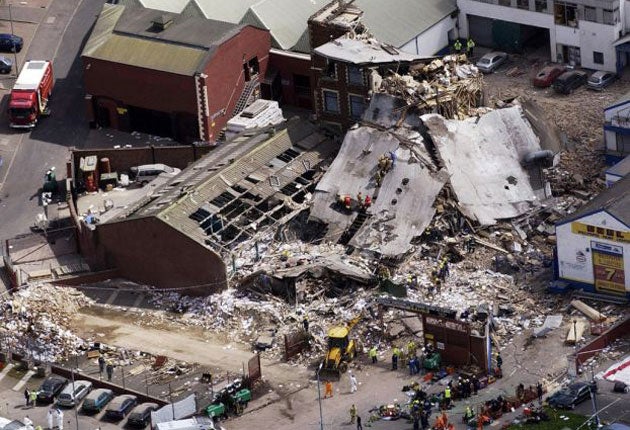Factory blast was 'avoidable'

Your support helps us to tell the story
From reproductive rights to climate change to Big Tech, The Independent is on the ground when the story is developing. Whether it's investigating the financials of Elon Musk's pro-Trump PAC or producing our latest documentary, 'The A Word', which shines a light on the American women fighting for reproductive rights, we know how important it is to parse out the facts from the messaging.
At such a critical moment in US history, we need reporters on the ground. Your donation allows us to keep sending journalists to speak to both sides of the story.
The Independent is trusted by Americans across the entire political spectrum. And unlike many other quality news outlets, we choose not to lock Americans out of our reporting and analysis with paywalls. We believe quality journalism should be available to everyone, paid for by those who can afford it.
Your support makes all the difference.A factory blast which killed nine workers was an "avoidable disaster", an inquiry into the tragedy found today.
Lord Gill said risks posed were "not identified and not understood" at ICL plastics in Glasgow.
A further 33 people were seriously injured in the explosion in May 2004 - caused by a build up of leaking gas which ignited.
Lord Gill called for similar metallic pipe systems - carrying the liquefied petroleum gas which ignited - to be identified as an "urgent priority" and replaced with polyethylene, a form of plastic.
The inquiry found that the underground piping, installed in 1969, was "out of sight and out of mind".
The report said: "It was inadequately protected when buried, it was subject to corrosion and ultimately it failed."
Management of ICL faced criticism over a lack of "knowledge and understanding" over the dangers leading to the explosion.
"Serious weaknesses" were found in the health and safety regime at the factory.
The Health and Safety Executive (HSE) was also criticised for an oversight in "failing to appreciate" the hazards posed by the buried pipes.
The Secretary of State for Scotland Jim Murphy, who today met relatives who lost loved ones in the disaster, said: "What is clear is that this disaster was entirely avoidable.
"It could have been avoided and it should have been avoided."
Mr Murphy said in Glasgow: "This report shows there were serious failings on behalf of the company and also the Health and Safety Executive.
"We now need to take urgent action to ensure this sort of tragedy can never be repeated anywhere in Scotland or the rest of the UK."
Mr Murphy said the Government accepted the report's recommendations.
He said: "We have asked the chairman of the Health and Safety Executive to report to Government within eight weeks, both to address the allegations of their serious failings in how they responded, and also to look at ways of strengthening the safety around liquid petroleum gas here and throughout the UK."
And Mr Murphy said: "It is clear there have been failings going back to the 1970s on this site.
"There were signs that things were wrong, things that were missed, things that were ignored.
"Work wasn't carried out properly, the site owners ignored some of the guidance," he said.
Scotland Office Minister Anne McKechin, who was with Mr Murphy as MP for Glasgow North at today's meeting with relatives, welcomed the report and its findings.
She said: "I think the key failing was over a very long period of time.
"It was the inability to keep proper records, the inability to assess properly what the risks were on the site, and the inability to keep the company to account for their actions."
Inquiry chairman Lord Gill said there should be "early inspection" of all buildings with an LPG supply to identify potential dangers.
He recommended an overhaul of safety regimes on the installation, maintenance, monitoring and replacement of all LPG systems.
This should include clear lines of responsibility between gas suppliers and users.
He found ICL did not understand LPG is heavier than air and when escaping would gather in lower areas such as drains, ducts and voids - increasing the risk of a blast.
The explosion on 11 May 2004 flattened the plant in the Maryhill area of the city in a matter of seconds.
The scene of devastation met by survivors led one worker to believe a plane had crashed into the building.
The investigation which followed was the biggest of its kind yet undertaken by Scottish authorities.
Evidence gathered in the £1 million probe, held over two sessions in July and October last year, heard the damaged pipework would have cost just £405 to replace.
Join our commenting forum
Join thought-provoking conversations, follow other Independent readers and see their replies
Comments